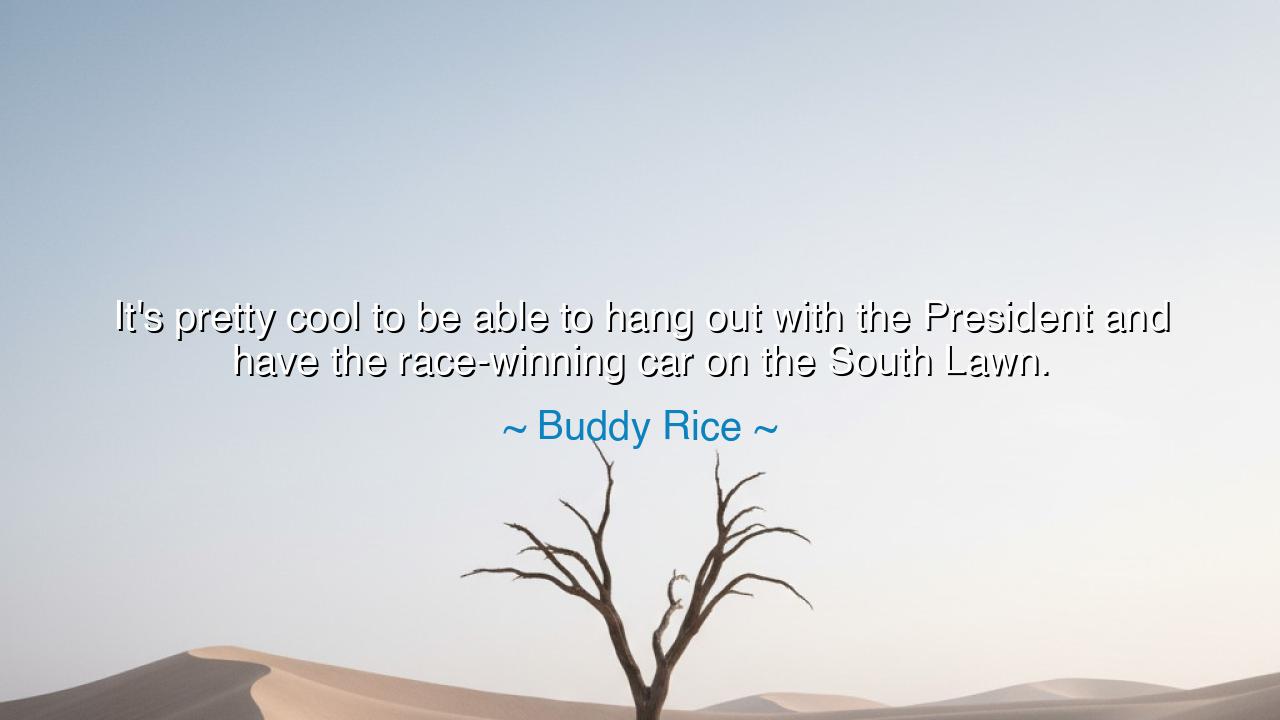
It's pretty cool to be able to hang out with the President and
It's pretty cool to be able to hang out with the President and have the race-winning car on the South Lawn.






In the sweep of time, there are moments when achievement and honor intersect in ways that elevate the soul and inspire generations. Buddy Rice’s words, “It’s pretty cool to be able to hang out with the President and have the race-winning car on the South Lawn,” speak to a moment of greatness—the culmination of years of hard work, dedication, and triumph. To be in the presence of the President and to have your victory recognized in such a symbolic space, the South Lawn of the White House, is not only a personal victory but a reflection of the honor and recognition bestowed by the nation. This moment represents more than just a win in a race; it embodies the larger journey of success, prestige, and the reward for striving toward excellence.
In the ancient world, similar moments of glory were celebrated by those whose deeds had risen above the ordinary. Alexander the Great, after conquering vast lands and establishing an empire, did not just rest on his laurels. Instead, he sought the recognition of his achievements through monumental acts—whether building cities, founding schools, or seeking the favor of the gods. But what truly elevated him was the acknowledgment he received from his people, as well as the recognition of his accomplishments by those in power. Much like Rice’s moment at the White House, Alexander’s victory was not merely for personal pride, but for the honor of his people and the legacy of his triumphs. In both cases, the individuals were elevated to a place where their successes were not just their own, but became symbols of collective achievement.
Consider the story of the ancient Olympic Games, where victors did not just win for personal glory, but for the pride of their city-states. The ancient Greeks held their champions in high regard, and it was not uncommon for athletes to be honored by kings and rulers. They were given laurel wreaths, statues were erected in their honor, and the people celebrated their victories. Olympic victors, much like Buddy Rice, had their accomplishments recognized at the highest level, their personal triumphs reflected in the honor bestowed upon them by society. This celebration of victory was not just about the act itself, but about the recognition that the individual’s success contributed to the greater good of their community.
Rice’s experience of having his race-winning car placed on the South Lawn of the White House also reflects a deeper truth about the power of symbolic spaces in recognizing human achievement. The South Lawn, a space often reserved for national events, represents the heart of the nation's history and achievements. To have his victory displayed there is not only an acknowledgment of his personal success but also an embodiment of the way victory, excellence, and leadership resonate within the collective soul of a nation. Just as ancient kings would hold grand feasts or ceremonies to celebrate victory, Rice’s moment represents the intersection of individual accomplishment and national pride.
The lesson in this moment is profound: greatness is not measured solely by personal accomplishment, but by the recognition and honor bestowed upon that achievement by others. In ancient times, great leaders and conquerors were celebrated by the people they served, not just for their successes, but for their ability to inspire and bring about change. Similarly, modern figures like Buddy Rice, through their dedication and excellence, inspire and elevate those around them. The public recognition of their efforts—whether it be through symbolic gestures like displaying a winning car at the White House or through awards and honors—is a testament to the collective spirit that greatness brings. To be great is to inspire others and to have that inspiration acknowledged by the world.
In practical terms, this teaches us that striving for excellence is not just for personal gain, but for the benefit of the community. Whether in our professional lives, our personal relationships, or our contributions to society, the true measure of success lies not just in the individual’s achievements but in the positive impact those achievements have on others. Like Alexander, like the Olympic victors, like Buddy Rice, we must seek to inspire those around us through our dedication and hard work, knowing that true greatness is not achieved in isolation, but in service to others and the world we share.
Therefore, let us not only seek personal success but also aspire to create a legacy that impacts the broader community. Seek the honor that comes with lifting others through your efforts. As Rice’s moment at the White House reflects, victory is sweet, but it is made even sweeter when that success is acknowledged and celebrated by the greater world. In doing so, we craft a future where our actions have lasting significance, where the victories we achieve are not just personal milestones, but stepping stones toward a greater good.






AAdministratorAdministrator
Welcome, honored guests. Please leave a comment, we will respond soon